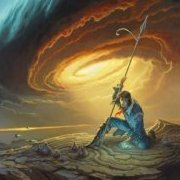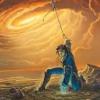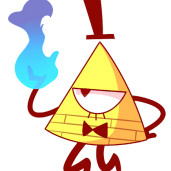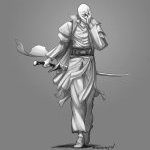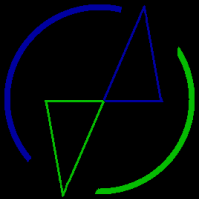Search the Community
Showing results for tags 'taravangian'.
-
So what are everyone's thoughts on Taravangian? I go back and forth between liking him and not liking him. I do not like his overall plan or methods but I usually like the guy when I am reading him and Dalinar interacting or when he interacted with Jasnah and Shallan in previous books.
-
One of the Ardents during an interlude chapter mentions that he has a strict deadline from his patron for the translation of a certain passage of dawnchant. I think this unnamed patron might be King Taravangian. I don't have any hard evidence for this, but it seems to fit, since Taravangian uses the translation of the dawnchant passage about the voidbringers as one piece of his many part attack on Dalinar.
- 2 replies
-
2
-
- dawnchant
- taravangian
-
(and 2 more)
Tagged with:
-
There are many smaller, more specific topics concerning aspects of Taravangian, including his capacity to save mankind, loopholes in his deal with Odium, and such. However, I wish to broaden our view of him, which is what this topic is for. I wish to ask the question, "How will Taravangian influence everything?" What is his role in the future? He has been shown to be a very important character, and I think he will certainly continue to be such. Some starter ideas: Taravangian is already old. How much time does he have left? Can he find a way to extend his life? Will he end up siding with Dalinar in the end? Will he ever affect any other worlds? I just thought it might be cool to see different ideas, even if they're all a bit wonky, so there's that. I put the [OB] in front just in case.
-

[OB] Taravangian and the Diagram -- not what we think?
taxilian posted a topic in Stormlight Archive
Forgive me if someone else has suggested this, but I didn't see a post that looked likely. I'm not sure I 100% believe this theory, but the sequence in OB where Taravangian met Odium got me wondering... what if Taravangian is basically keeping secrets from himself? What if the "super smart" version of himself realized that he could never keep secrets from Odium, so he set things up so that he himself would think he was working towards one thing but was actually working towards something different. Perhaps cultivation gave him more than he currently thinks (Fortune? etc) -- but it's gone now and he has no idea. Perhaps Taravangian has actually been working towards exactly what is happening and doesn't even know it himself because the Diagram was set up so cleverly that it mislead him. Evidence: When Odium looked at the diagram, there were things that he apparently somehow could not see -- things that were hidden from him: The diagram seems to almost "change" as it goes -- this could be contingency planning, but it could also be that the goals they think they work towards are not actually the real goals. This feels far-fetched, but at the same time it looks like *something* strange is going on. Perhaps Taravangian has unwittingly set himself up as a double agent. -
Is anyone else getting the vibe that Dalinar is going to try to step down as "High King" in order to pursue his goal of unification? We've already seen him spend two books and part of a third realizing that forcing Alethkar to "unify" by force didn't really achieve the desired goal, and furthermore entrenched "The Blackthorn - Bloodthirsty Warlord" into the minds of most of the other monarchs. Regardless of whether Taravangian becomes another Bondsmith, I can see Dalinar offering "peaceful" Taravangian the position and moving most of the Alethi forces out of Urithiru in an attempt to sway the otherwise obstinate nations to unlock their oathgates.
- 2 replies
-
1
-
- dalinar
- taravangian
-
(and 2 more)
Tagged with:
-
I'm referring to this epigraph in particular: More and more, I think there may be something to this. Dalinar the Politician is horribly ineffective, and I don't think he has the time to build up enough political acumen to actually be good at it. Contrast this with Dalinar the Warlord, who is able to draw the loyalty of a man who had just been trying to kill him (thinking of Teleb here). Dalinar the Politician tried to maneuver Elhokar into making him Highprince of War, enforce the Codes, and make the highprinces work together. Dalinar the Politician failed miserably. Dalinar the Warlord kicked the king in the chest and made all the above happen. Dalinar the Warlord seems to succeed where Dalinar the Politician flounders. I think there's a potential for Dalinar's journey in this book to be partly about discovering that he can be both the Warlord and a good man. If so, I think this line from Tanalan may prove to be an interesting bit of foreshadowing:
-
Mr T is a very interesting character; in a way it's hard to classify him as a "bad guy" or a "good guy". List of pertinent facts I can think of 1. He wants to save the world - this is fairly clear from his private thoughts. 2. His plans were born out of Gavilar's visions -> ostensibly a source of good ideas 3. His apparent objective is to unit the entire world under him to fight Odium -> sounds Bondsmith esque 4. He has had lots of people assassinated and has generally sown chaos across large parts of the world on face value this seems Odium esque 5. He kills invalids/poor people in order to extract information -> doesn't seem to fit with Life before death 6. He has one or more soulcasters and two or more shardbearers under his command 7. He apparently has one or more radiants working for him 8. He has conquered Jah Kavad 9. He knew that Surgebinders would be returning 10. He wants to kill Dalinar Trying to put all of this together... His basic plan appears to be: 1. I need to unite the whole world to fight Odium BUT 2. Diplomacy would take too long SO 3. Kill all the other leaders He seems to know a lot of stuff that most people don't and even with the large library in Kharbranth the level of knowledge he has (knowing new Knights are coming and how the bonds work, knowing that the parshendi were potential voidbringers, knowing what broke the Knights before) it seems suspicious implying that he has access to a privileged source of some kind, could this be a spren? Why does he want to kill Dalinar? It seems that it may just be that he wants the whole world united under him and doesn't want a rival as fighting a war (against Odium) would be harder with mixed leadership, but in that case is he about to flip? Is he now going to throw his lot in with Dalinar to unite the world or is he still worried about competition? Ultimately I see 4 possible end results for Mr T OPTION 1: Mr T the ally - Mr T allying with Dalinar working with him to save the world, most likely as a second Bondsmith bonded to the cultivation super spren -> the one thing I don't like about this idea is that as a reader it will feel quite unsatisfying if Mr T's evil actions are never publicly revealed/punished; maybe he will be a Bondsmith but will end up being killed by Dalinar for what he's done after they work together for a little while? OPTION 2: Mr T the unintentional villain - think of Pedron Niall from Wheel of Time - a very competent character trying to do bad things for good reasons but with an end game based on having misunderstood what's actually going on who ends up doing more harm than good - this version of Mr T probably tries to kill Dalinar possibly by using another assassin; he's ultimately trying to do good but is so muddled up about how to do it that it's all a disaster - this version of Mr T would most likely seriously hinder the "good guys" plans but may ultimately have some kind of redemption scene. OPTION 3: Mr T as a pure villain - Mr T is being controlled/manipulated by Odium into doing what he's doing he doesn't know this but he's preparing the world for Odium to destroy it. OPTION 4: Some kind of hybrid, two out of the above 3 or one turning into another. So, what do you think? So, what do other people think, OPTION 1? to me that seems to be where things are hinting at the moment, I did think Option 2 for a while but there are several hints that I think make Option 1 more likely, the bondsmith like characteristics and having a radiant; though with OPTION 2 the radiant could be a fake or a dupe... Or is there something I've missed that adds another option or removes one of these?
- 50 replies
-
3
-
- taravangian
- mr t
-
(and 4 more)
Tagged with:
-
The Radiants have begun their order. So far we have 5 who we know have sworn there oaths. But is there an actual counter to each hero in our villains? The rule is that they're motivations are similar to our heros but uniquely twisted. For Dalinar we have Taravangian who seeks to Unite in the most twisted way possible and also gathers visions granted by a higher power (Moelach in his case) He unites BY destroying, therefore anti bond smith For Kaladin we have Moash, someone who has also had family killed by the light eyes but seeks to kill those he hates, breaks his word to protect the Kholin family, and ACCEPTED shards where Kaladin did not. It's these two that are the clearest. As for Jasnah I would have to say one of the worldhopping ghost bloods since in theory she too can(has?) world hopp. Mraize perhaps but it seems flimsy I think each character will have a Rosharin counter. Then of course there is Eshonai and her sister, one who sought peace, vs one who did not, one who was tricked by the other to embrace Odium. While her sister embraced it long before. Perhaps it is not as cut and dry as this, but it works well so far, im not sure about Shallan, Renarin, or Lift yet.
- 43 replies
-
3
-
- mr. t
- taravangian
-
(and 3 more)
Tagged with:
-
Earlier today I was discussing Odium and his potential with future sight with some people and it led me down an interesting line of thought. We know Rayse is a schemer and he uses Moelach to collect Death Rattles in order to see the future, for whatever reason. It could be that he's capable of using them in order to gain access to Honor/Cultivation's abilities- humans on Roshar are of them after all- in order to more accurately pin down the future. If this is true, it might mean that Odium is using Moelach to scan for specific bits of info he's not capable of finding out on his own. However, Odium is a schemer and the Death Rattles being collected are flawed. Anyone that is near can hear them, giving them some insight into the future and possibly Rayse's plans. For someone that is supposedly crafty and dangerous, this seems like a huge flaw in one of his lieutenants, especially one he might be reliant upon. Then it came to mind that he could be using Moelach for another purpose, to mislead King T into following his will without him realizing it. When on his supposedly most brilliant day, he brought up Moelach, though the manner in which he did so was a little suspicious. The way he phrases it almost makes it seem that he wishes for his future self to ignore Moelach and focus on more important tasks, like becoming a proper ruler for the world to follow behind. Thus leading to the chaos in Jah Keved. Yet, why waste such a powerful resource? I believe King T. knew at the time of the Diagram's creation that it'd grow more and more inaccurate and the Death Rattles would possibly provide a way to alleviate that, however I also think he knew that if he did so then all of his actions would become suspect, possibly tainted by Odium's own influence. So he decided to steer his future self away from that simple fix and instead focus on rulership. As fate would have it however, the present King T. decided that the resource was too valuable to ignore and started to harvest it. Essentially allowing Moelach to control and direct King T's actions and thus polluting the Diagram. Moelach then decided to leave Kharbranth and focus on other tasks that were at hand, like the wars in Jah Keved. Thoughts?
-
Hi all, I come here frequently reading through the various theories. First time posting. I had an idea about Taravangian that I haven't seen around. First, I assume that his request to Nightwatcher was made like he quotes in WoR "The capacity to stop what is coming. The capacity to save humankind" Secondly, I'm a fan of the theory that this request could have been interpreted as two separate requests (not sure of an original theory source, but mentioned here https://www.reddit.com/r/Cosmere/comments/6338rr/sa_taravangians_capacity/). Not mentioned is the possibility that he might have two curses. I don't recall there being a limit of one boon/curse for the Old Magic. I don't necessarily think this theory will turn out to be true, and it's not necessary for my theory, but I like its possibility. Finally, my addition to the discussion of Mr. T's plot: What if he's mostly right, the diagram will work, defeat Odium, stop the voidbringers, but it will destroy all (most?) life on Roshar other than "humankind". His solution will work, but it will only save humans. It stands to reason that, as apparent slaves to Odium, the Listeners also need saving at the very least. Then the various non-human and partial-human races and maybe even non-sentient life (if anything on Roshar can really be called that) Also, of course, the spren. It just seemed to me that the solution of the diagram may work but be incomplete and that the larger strife between the Diagram-ites and the Radiants when the big battle comes won't be who needs to win, but rather who needs to survive. Mr. T saving only humans, Radiants desiring to save everyone.
- 6 replies
-
5
-
- taravangian
- diagram
-
(and 1 more)
Tagged with:
-
This theory has two pieces. I think both of them have been partially introduced by others, but I haven't seen the pieces put together in this way yet (if I missed it, I'm sorry, I searched the forums as best I could but it is entirely possible I missed something). Also, I think this theory has some issues, which I will bring up at the end, but I still want to put it out there as an interesting thought (and who knows - maybe someone can help me resolve the issues). First off, I think that the source of Taravangian's variance in capabilities and behavior come from his consciousness moving in some way between the Cognitive and Spiritual realms. When his consciousness is primarily in the cognitive realm, he becomes very logical and rational (in a limited sense) but he loses his spiritual connection to others. According to this WoB, there is nothing inherent to intelligence that makes you less empathetic - this correlation is unique to Taravangian: The second part of the theory is, in my opinion, the more interesting piece, although it relies on the first part. I think that on the night of the Diagram, Taravangian was not maximally pulled into the Cognitive Realm. Instead, I think he was pulled in the opposite way into the Spiritual Realm. I think he was pulled in so far that he broke through to the point that he could easily see into the future and look at the web of possibilities spread out before him, similar to what happened in Hero of Ages when This would explain why the event seems so spectacularly improbable from the perspective of raw intelligence; it wasn't brought about by intelligence, but instead by genuine visions of the future. Taravangian thinks the Diagram is a product of intelligence because he is biased to assume that intelligence is what matters. It seems like his overall nature is to be cold and calculating, even on a "normal" day. It wouldn't occur to Taravangian that there might be more power in spiritual connection than in raw intelligence. I think this also might explain the overall cryptic, incoherent nature of the Diagram. It wasn't the result of a cold, rational mind, but rather of a rush of foresight. The biggest issue with this theory, IMO is the overall "cold" or "clinical" nature of the messages we've seen. That seems characteristic of his personality when his spiritual connection wanes, not when it is at it's highest. I honestly don't have a good rebuttal for this right now. Maybe at a certain point of spiritual awareness, something like your "true" personality comes out? It could also be that once Taravangian became equally connected to everything, his natural spiritual empathy for particular individuals went away, leading to this apparent coldness. Bonus theory: the language he "invented" is actually an ancient language used by whoever lived in that spot many millennia ago (maybe the Parshendi), and his extreme levels of spiritual connection made it dominate his mind.
-
So, from the Oathbringer prologue, we have some new information. Specifically, we now know what the motivations of each of the three men trying to "unite them" might be (based on the instructions obtained from the Almighty's vision-diary). Gavilar & Dalinar each received the visions from the Stormfather, and Taravangian heard about the visions from Gavilar. We are directly told that Gavilar intended to "unite them" with a threat of danger. We can infer that Dalinar is determined to "unite them" through common purpose & a sense of honor/duty. We can also infer that Taravangian is attempting to "unite them" with deception, political conquest, and esoteric methods (e.g. death rattles, Nightwatcher-granted super intellect, manipulating a truthless) Obviously, Dalinar is the only one of the three who is going about his efforts at unification in a manner consistent with the first oath of the Knights Radiant. However, my thoughts go from this observation to the secret societies. We have the Diagram society, the Sons of Honor, and the Ghostbloods. Of those three groups, two are represented in this group of men (Gavilar → Sons of Honor & Taravangian → the Diagram society). We also have two of the three shards whose power influenced the formation of two of the societies (Honor → Sons of Honor & Cultivation → the Diagram society). So, where do you all think the Ghostbloods fit into all of this? Acknowledging that it's pure conjecture, likely coincidental, and that correlation does not equal causation; is there any chance the Ghostbloods have a connection to Odium? Wild Cosmere theory: The Ghostbloods do a lot of world-hopping. If the Ghostbloods are connected to Odium, do you think there is a chance that Kelsier might have created a link between Roshar and the Southern Scadrians via Iyatil? What about the possibility that a chance encounter between Kelsier & Odium (or a more mundane connection via the Ghostbloods) is influencing the "other god" goings-on on Scadrial in the Wax & Wayne era?
- 11 replies
-
- ghostbloods
- sons of honor
-
(and 6 more)
Tagged with:
-
So, I was Lost in Thought, and I made a few discoveries. Upon my return from the Cognitive Realm, I feel an urgency to tell you what really happened to Taravangian, King of Kharbranth. First, a little review. After hearing about Gavilar Kholin's visions, and following his assassination by our friend Szeth, Taravangian sought out the Old Magic. His request from the Nightwatcher was for "Capacity. The capacity to save mankind." As we all know, the Nightwatcher hears your requests, then gives you what she feels you deserve, along with an accompanying curse. In Taravangian's case, he has his intelligence (mental capacity) vary day by day, and his compassion vary according to his mental capacity. So on one day he can be brilliant and coldhearted, and the next day is slow of thought but empathetic. Now we get into controversy. Which is his blessing, and which is his curse? One is the ability to be both dumb and smart, and the other is the ability to be both empathetic and indifferent. Neither sounds entirely like a blessing or a curse to me. My discovery, therefore, is this: He was indeed given two abilities, a blessing and a curse, but they are different from what we've previously assumed. One is zinc Allomancy, and the other is zinc Feruchemy. (We leave it to His Majesty's mind, on a strong day, to deduce which is which.) However, he was unaware of these powers. Thus, some days he stores mental speed while Rioting compassion, while other days he taps the "mental capacity" stored previously. And one day, by accident, he began Compounding. Countering objections concerning the Nightwatcher. Now all Taravangian needs to do is recruit a Scadrian worldhopper to work on the Diagram.
- 19 replies
-
5
-
- taravangian
- zinc
-
(and 1 more)
Tagged with:
-
I'll make this brief. But I believe the point I am making is somewhat significant, because it indicates that the diagram may not be what it seems. The stated purpose of the diagram is to ensure that some small fragment of humanity survives the desolation, no? And yet... In the diagram, Taravangian implies that he at least partially grasps the implications of worldhoppers on Roshar. So... The diagram is supposedly meant to be all about making sure humanity doesn't go extinct when Roshar gets destroyed... But Taravangian already knows that humanity exists on other worlds, and so would not go extinct even if Odium totally destroyed Roshar. Now, I get that saving some of the lives on Roshar is still a worthy goal... But the diagram does not indicate that Taravangian is simply trying to do damage control and salvage some of Roshar. The diagram indicates that everything is irrelevant but the survival of humanity. Those words sound a lot like Taravangian believes that if Roshar is destroyed, humanity will no longer exist. There are really only two conclusions I can make of this. Either 1. Taravangian realizes other worlds exist, but believes that Odium will be able to destroy those worlds easily once he destroys Roshar or 2. The diagram contradicts itself, and is highly suspect. Why is that suspect? Well, either taravangian made a pretty dumb mistake while he was super super super intelligent, or something manipulated him.
-
So we know Taravangian is acting pretty evilly (although he believes he is saving the world). He is sending assassins after everyone (including Dalinar), and a lot of what he is doing is a direct threat to honor and the radiants. Initially, I thought he was probably somehow under the corruption of odium... But maybe not. You see, everything he does is shaped by his gift from the nightwatcher. And the nightwatcher is a splinter of cultivation. I don't think we know for sure that cultivation's and honor's intents are in perfect accord. Maybe both are trying to save things but they still work against each other to an extent. Odium might well still be involved... But I think we should not assume that cultivation is basically aligned perfectly with honor. Cultivation is a distinct third shard acting on this planet.
-
I have seen a few threads about the Diagram, but I think I have a different take on it. Apologizes if this has been discussed before! My theory is that the on the day the Diagram was written, Taravangian was NOT actually as smart as he thinks he was. Instead, something ELSE was influencing/affecting his mind on that day. Evidence: 1. The level of intelligence needed was statistically very unlikely Brandon gives us several pages where Taravangian and an advisor are discussing the probability distribution of Taravangian's intelligence, and the conclusion is that the "Day of Brilliance" was VERY unlikely: This interlude makes it clear that the "Day of Brilliance" was significantly outside Taravangian's normal intelligence range. I believe that this whole section is a hint from Brandon that maybe we should treat that day with suspicion, because Taravangian's supposed super-intelligence doesn't fit his usual curve. 2. The Day of Brilliance was different from other smart days On the day he created the Diagram, Taravangian's behavior was described as "babbling the whole time", "lucid insanity", and "madness". He also has no memory of that day: On his second most brilliant day, there is no evidence of insanity or madness, and he remembers it clearly: Taravangian's theory seems to be that both the madness and forgetfulness were byproducts of being off-the-charts brilliant, but I don't think we necessarily need to accept that explanation. I don't see why becoming smarter would lead to insanity or forgetfulness. In fact, I believe that the passages above, providing a direct contrast between remembering one bout of intelligence and not remembering the other, might be another hint that the Day of Brilliance wasn't what it seemed - it's another way in which it doesn't fit his usual pattern. Another discrepancy that I have seen others mention: Typically on Taravangian's smart days, he is correspondingly stupid about predicting human behavior. Yet, that doesn't seem to be the case on the Day of Brilliance. In fact, MOST of his predictions are about human behavior. Some have theorized that he could get smart enough to make up for his lack of empathy with sheer deduction ability, but that explanation is unsatisfying to me. 3. Raw intelligence could not have predicted the future so accurately In my opinion, creating the Diagram should have been impossible with ANY level of raw intelligence. Taravangian would only be able to extrapolate from what he already knew, and some of his knowledge seems like it couldn't just be rationally deduced (e.g. "the secret that broke the Knights Radiant" or "the nature of the bond", specific concepts like "Nahel bond" and "Investiture"). Also, extrapolating human behavior years into the future, even with infinitely high intelligence, just seems implausible to me. It seems like you would just have too much error and uncertainty adding up. Words of Brandon I asked Brandon about this on Reddit, and his answer was not conclusive, but he also didn't outright deny my suspicion: Conclusion? Whatever The Diagram is, it's not just rational deduction To me, Taravangian's theory that he predicted the future through sheer deduction seems far-fetched. A much better explanation is that this is exactly what it seems: - Madness - Scribbling on walls - Predicting the future - Not remembering ...Sounds like prophecy, right? My guess is that some other power was able to influence his mind on that day and give him knowledge of the future. Whether that "other power" is helpful or harmful is up for debate! Other misc thoughts 1. Cultivation has been associated with prophecy, and also has a link to the Nightmother... maybe there is some connection there. 2. If this theory is correct, it means that Dalinar and Taravangian both visited the Nightmother, and were both mentally influenced by prophetic visions... maybe receiving a "gift" from the Nightmother makes you open/vulnerable to something? (I'm thinking, similar to Ruin with Hemalurgy?) 3. Taravangian thinks that he invented the script that he used to write the Diagram, but since he doesn't remember that day, how can he be sure? Maybe during that day, he simply had knowledge of some other preexisting script? Might set up an interesting reveal later when somebody recognizes that script somewhere else! Thank you for reading!!
-
Soooooo.... I always loved the concept of Taravangian , a man with varying intelligence and compassion. So recently I re-read the interlude from WoR that explains (sort of) how his boon and curse work . And then something peaked my interest but to give you my point of view I would like to clarify some points Taravangian got this "power" when he asked for the capacity to stop what is coming the nightwacher doesn't give you what you as (no matter how well you phrase it) but intead what she thinks you deserve and a curse to go along with it -as we learn from the shalash interlude (don't remember the number) in one of Dalinar's visions Tanavast (Haonor) tells him that although he can read the future Cultivation is far better at doing so So, is it possible that Cultivation through the Nightwacher gave Taravangian this power predicting his actions and knowing that this way it would be better for Roshar in the long run? I think yes
- 7 replies
-
- nightwacher
- cultivation
-
(and 2 more)
Tagged with:
-
So, most people seem to believe, as Taravangian does, that the Diagram is the result of his most genius of days (though a few mentions have been made of "something more supernatural" going on). My theory is that the Diagram was written at his most empathetic, and that Cultivation is the true author (though it was written by Taravangian's hand). My reasons: In WoR I-14, Taravangian comments that "genius and idiocy are so similar," that on his "most stupid days and [his] most incredible, [he] is unable to interact with those around him in a meaningful way." In fact, about the day of the diagram: "Then, too, he'd spent the day staring at the wall." (Emphasis added, presumably drawing a parallel to his behaviour on his supposedly most stupid days). Perhaps he feels that, at the extremes, the only way to tell the two apart is the result? Taravangian treats the Diagram with "reverence", as if it is "holy". The author of the Diagram repeatedly refers to someone (presumed to be Taravangian) in the second person (presumed to be his most brilliant self talking to his future, less intelligent self). The only quoted time, in fact, that the author uses the first person is in reference to "the wanderer," whom many people posit is Hoid, whom Taravangian seems to have no reason to know of. The entire Diagram is prophetic, to a high degree of detail on a massive scale. The Diagram is in a hitherto unknown language that is more expressive in ways required to discuss some of the advanced concepts it covers. [Intuitive leap, based on other speculation and thematics] Taravangian at his most intelligent is introspective, so rejects external influence in favour of his own knowledge and reasoning. At his most compassionate/empathetic he is most susceptible to external influence, having no conscious thought to get in the way. Also: Cultivation is known to be one of the Shards with greatest foresight. The vessel of Cultivation existed in an advanced civilisation prior to humanity existing on Roshar. The Nightwatcher: ...seems to be, or be connected to, Cultivation, with Wyndle (Cultivationspren, according to WoB) appearing to call it "Mother" in WoR I-9. ...granted Taravangian the "capacity to save the world". Therefore, the author of the diagram is Cultivation, while Taravangian was at his most dull, and so most susceptible to Her. This aligns Taravangian's interpretation of the intent (Intent?) of Diagram, being to tear civilisation almost to the ground in order to build it stronger, with a ubiquitous gardening technique that would come totally naturally to Cultivation: pruning back plants, in some cases to the ground, helps them grow fast and stronger. This actually aligns with a previous theory, in which it is by Taranvangian's empathy that the world will be saved, and also with the last comment on that theory, which is that Taravangian's (Cultivation's?) approach to saving the world is a valid-but-conflicting alternative to that of the known KRs (particularly Kaladin, guided by Honor):
- 34 replies
-
14
-
- diagram
- taravangian
-
(and 1 more)
Tagged with:
-
So I was the images on the coppermind and noticed something strange. http://coppermind.net/w/images/Kharbranth.jpg Look at the corners of the map of Kharbranth. http://coppermind.net/w/images/TWoK_Rear_Endsheet.jpg Now take a good look at the Dustbringer glyph. (Red one on the right side) Seem familiar? What do you guys think it means?
-
From the end of WOR, it seems we have two groups who are or will grow to be the main powers on Roshar: the Taravangian led Diagram; and the Dalinar led Radiants (I know that he does not truly lead them but he is the closest that they have right now). While I am sure other groups will come into play, I am not sure that they will be able to match these groups easily. What I want to discuss is the different plans for weathering the coming storm. It seems to me that the Radiant strategy will rely more around fighting their way through the desolation. I know many orders were not necessarily fighters (although they all seem to possibly get a shardblade anyway) but in my mind, the strategy is more directly confrontational. They want to protect as many people as they can while also fighting back against the voidbringers. This is what they have done in the past but never without the Heralds. It may not work well to use this same strategy, with or without them. Taravangian, on the other hand, seems to be more about survival by any means. This may be what is required to make it past the desolation this time but one wonders at the cost. It seems to me (from the quote above) that he believes as long as enough of humanity survives to allow them to repopulate, he has done his job. But this may even mean sacrificing all other humans besides this necessary seed population. The Diagram would likely see no difference between using all remaining humans to fight/protect this seed or slitting their throats themselves as long as it served their ultimate goal. Obviously, I am somewhat skeptical of the morality of the Diagram. Like I said, it may offer the best hope for Roshar but the sacrifices of the innocent that it could allow makes me wonder. I am also somewhat biased towards the glory of Radiant battles (how Alethi of me). But I do know that the Radiants will have to be and do more than they have in the past if the hope to actually make it through this fight. What do you guys think?
- 37 replies
-
3
-
- taravangian
- dalinar
-
(and 2 more)
Tagged with:
-
Major characters! CLICK HERE to open up full size. CLICK HERE to open up mini version to use in the new profile's cover photo. It fits!! I drew Sadeas to have a punchable face, and Amaram to be less punchable because he's supposed to be a smarmy smug wannabe-Radiant who looks like a normal dude from the outside. I imagined him to be late 30's or almost or about 40, because Jasnah was 34 as of WoK and he was her almost-husband. Taravangian is supposed to be like a wise sage kungfu master grandpa, who looks harmless. Taln wears yellow because topazes are the gemstone of the Stonewards, but later I looked it up and found out that topazes can come in other colours than orangey-yellow, but it was too late for that. Wit has a medieval pageboy haircut because his job is to something like a King's minstrel and his blue eyes are somewhere in between light and dark.
-
People Moash is working for are Diagramists, right? (Dude with Moash when fighting Kaladin at end of WoR says this isn't what the diagram said or something along those lines) Shallan is working for the Ghostbloods, right? Don't feel like finding the quote again (I found this like 6 months ago and thought I had posted it but I guess not), but Shallan's employer told her that Amaram's life is reserved for another. Moash and the rest of Bridge 4 is, at this point, the only group of people who know Kaladin is a Radiant, and unless the Ghostbloods tracked him all the way from the battle where he became a slave, Moash is the only one who knows that Kaladin hates Amaram (come to think, this might have been after Adolin's 4v1, but I don't think so, and even still there's no reason the Ghostbloods would keep Amaram for him) Therefore Ghostbloods = Diagramists, or at least they are working together. This whole theory is from like 6 months ago, so I might be wrong.
- 5 replies
-
- ghostbloods
- diagramists
-
(and 2 more)
Tagged with:
-
In WoK, Taravangian had Jasnah Soulcast the stone in the doorway. Later, he had Shallan draw a portrait of him. He was likely familiar with how Soulcasters are used, and was also likely familiar with the Lightweavers' talents at memorization. I propose that he was looking for Radiants, looking for the skills and abilities that Radiants intuitively possess. Who knows exactly what he wrote underneath his bed frame?
-
The inverse link between Taravangian's "capacity" (read: intellect) and his compassion has always bothered me. Apparently, it bothers Taravangian, too. On the days when he is most intelligent, he is at his least compassionate. Or so he believes. Have you guys ever heard of the Milgram Experiment? Basically (and I'm greatly oversimplifying), the participants were told that they were taking part in a teaching experiment. Whenever the "learner" (who was in another room, and a confederate of the psychologist) got an answer wrong, the participant was told by the psychologist running the experiment to administer an electric shock. Eventually, the learner would start screaming and begging for mercy, then finally stop responding as the supposed shocks increased in intensity during the course of the experiment. Over 60% of test participants (and this test has been repeated numerous times and in numerous cultures) usually continue with the "shocks" to the fatal level. What does this have to do with Taravangian? The Milgram Experiment was about authority- whether people are willing to override their own moral compass and compassion when ordered to do so by an authority figure. I've always read a little more into it, though. It's not just about an authority figure- it's about being able to transfer responsibility for the act to someone else. In the case of the Milgram Experiment, it was because the participant was "just following orders," thus (in their mind) putting the responsibility for the acts on the shoulders of the psychologist. Or, to put it in another way: My theory is that the Nightwatcher did not curse Taravangian by inversely linking his compassion and intelligence. I theorize that this is a lie that he tells to himself, something that he has thoroughly convinced himself of, so that he can continue to do what he thinks is necessary. Even when he does feel guilt for his actions, he ultimately has someone else to blame- the Nightwatcher, for making him this way. You'd be surprised the sorts of things that people can convince themselves of when they don't want to face an ugly truth. Especially an ugly truth about themselves. Or, maybe you wouldn't be surprised- just look at the mental gymnastics that Shallan goes through to forget aspects of her own past. Of course, for this to be true, that would mean that Taravangian does not actually know the curse that the Nightwatcher afflicted him with. We don't know enough about what happens when someone goes to see the Nightwatcher to know if this is plausible. Does she tell them what their boon and curse are? Or are they left to figure it out for themselves? I have an interesting image in my head of Dalinar leaving the Valley and traveling home, not knowing the nature of his curse was until the first time someone mentioned his late wife. Lift gives no indication that she is cursed or thinks of herself as cursed, or has any idea what her curse might be (though she doesn't really think of the Nightwatcher or the Old Magic much at all, which doesn't give us much to work with). Many of the other curses we hear tell of (numb hands, upside-down vision) are obvious in an immediate sensory way, meaning that no explanation would have been necessary from the Nightwatcher. I suspect we won't know such details of the mechanics of a visit to the Nightwatcher until we actually see one, directly or in flashback. Taravangian is one of the most fascinating characters in the series to me. I really came to like him in Way of Kings and, when the big reveal about what he was really doing in his hospitals came about at the end, I felt betrayed. This kindly King, who builds hospitals and loves all, is a mass murderer? I was thoroughly shocked. My feelings about Taravangian changed forever in that instant. He, more than any character in the series so far, earned my ire in that instant. Learning about the nature of his intelligence/compassion dichotomy in Words of Radiance has not made me feel more charitable towards him. Instead, I see it as being much like Szeth- committing terrible atrocities because he can find a way, on some level, of blaming someone else. The idea that the lack of compassion in his diagram is directly caused by a curse rings hollow to me. I find the idea that Taravangian has desperately convinced himself that his lack of compassion is due to a curse to be much more compelling. And I wonder what the revelation of that fact, should I prove to be right, would do to Taravangian. The idea that the diagram calls for such cruelty and evil not because his more intelligent self was inherently without compassion thanks to the Nightwatcher, but because of his own choice (conscious or unconscious)... Well, I suspect that it would break him.
- 14 replies
-
6
-
- stormlight archive
- taravangian
-
(and 1 more)
Tagged with:
-
I wonder if this means that at the end of the fifth book, they manage to revive/speak to Honor (or the Stormfather). And maybe the only way to stop Odium is for Honor to sacrifice himself, and he refuses. Or a more sinister interpretation: The First Ideal calls for Life Before Death. Possibly one of the new KR needs to sacrifice himself, but, unknowingly, chooses to live and so fails. It's also suspicious how it trails off, like there might be more to it. "The choice of honor is life..." but they chose death? ...life before death? Ideas? Am I crazy?
- 53 replies
-
4
-
- taravangian
- death rattle
-
(and 3 more)
Tagged with:




